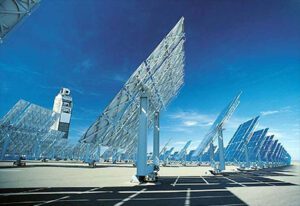Electric Power Research Institute Launches Study for Transformation of the Electric Power Grid
 PALO ALTO, California. The Electric Power Research Institute has launched a study on the transformation of the electric power grid. The rapid rise of Distributed Energy Resources (DER) — such as rooftop solar panels and high tech microgrids — could change the structure of the electric grid. Yet even as these technologies rise rapidly, very few organizations have looked at how these technologies could be integrated into the electric power systems so customers can enjoy the benefit of both the central power system and the distributed technologies in the most cost-effective way. The potential for this “integrated grid” is a transformation in the ways that electric power is supplied and used.
PALO ALTO, California. The Electric Power Research Institute has launched a study on the transformation of the electric power grid. The rapid rise of Distributed Energy Resources (DER) — such as rooftop solar panels and high tech microgrids — could change the structure of the electric grid. Yet even as these technologies rise rapidly, very few organizations have looked at how these technologies could be integrated into the electric power systems so customers can enjoy the benefit of both the central power system and the distributed technologies in the most cost-effective way. The potential for this “integrated grid” is a transformation in the ways that electric power is supplied and used.
“The grid is expected to change in different, perhaps fundamental ways, requiring careful assessment of the costs and opportunities of different technological and policy pathways to fully integrate DER into the electric power system,” said Dr. Michael Howard, President and CEO of EPRI. “If we are going to realize the full value of these resources, while at the same time continue to provide affordable and reliable electricity, we need to integrate them into every aspect of grid planning, operations and policy.”
“These systems can be complementary and not competitive if we acknowledge that both systems benefit the customers and integrating them will enhance the benefit to all customers, while failure to integrate fully could lead to higher costs and lower reliability.”
The paper released today, which is the first in a series of integrated grid studies from EPRI, outlines an action plan that needs to be addressed by all stakeholders with examples to support fact-based discussions. The study leverages EPRI research in this area and the lessons learned from the circumstances surrounding Germany’s extensive deployment of distributed solar PV and wind that offers important lessons about the technical and economic value of planning for integration of DER.
The paper describes a critical need for collaborative solutions, including:
Updating interconnection rules and communication standards that enable distributed resources to integrate with the grid;
Deploying advanced distribution and reliability technologies that provide flexibility and connectivity for distributed resources and system operators;
Integrating DER into grid planning and operation;
Informing policy and regulation to enable transformation to the Integrated Grid.
When fully integrated with today’s system, EPRI anticipates these resources can contribute more effectively to system capacity, flexibility, efficiency and environmental attributes.
Today at a meeting of the National Association of Regulatory Utility Commissioners, EPRI unveiled an initiative to provide stakeholders with knowledge, information and tools needed in developing an integrated grid:
Phase I – A concept paper (link below) to outline the main issues while outlining real examples to support open fact-based discussion;
Phase II – A framework of analytical tools and procedures that can lead to the effective integration of distributed and central resources, which EPRI refers to as an integrated grid;
Phase III – Global demonstrations and modeling using the analytics and procedures developed in Phase II to provide comprehensive data and information that stakeholders will need for cost-effective, system-wide implementation of integrated grid technologies.
The EPRI paper, “The Integrated Grid: Realizing the Full Value of Central and Distributed Resources,” can be downloaded here: epri.co/3002002733. For additional information, you may also visit www.epri.com/integratedgrid.
About EPRI
The Electric Power Research Institute, Inc. (EPRI, www.epri.com) conducts research and development relating to the generation, delivery and use of electricity for the benefit of the public. An independent, nonprofit organization, EPRI brings together its scientists and engineers as well as experts from academia and industry to help address challenges in electricity, including reliability, efficiency, affordability, health, safety and the environment. EPRI’s members represent approximately 90 percent of the electricity generated and delivered in the United States, and international participation extends to more than 30 countries. EPRI’s principal offices and laboratories are located in Palo Alto, CA; Charlotte, NC; Knoxville, TN; and Lenox, MA.

